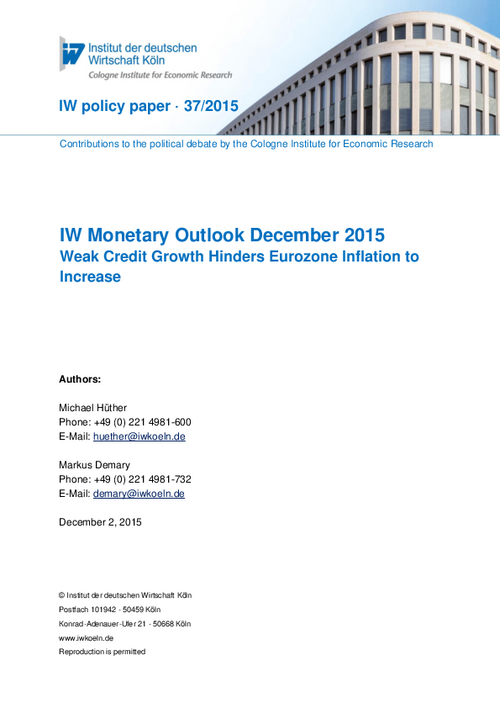Weak Credit Growth Hinders Eurozone Inflation to Increase

IW Monetary Outlook December 2015
IW policy paper

Weak Credit Growth Hinders Eurozone Inflation to Increase
While the ECB still struggles with an impaired bank lending channel of monetary transmission, the Fed successfully fought the labor market slack that was caused by the great recession of 2008. Due to the improved labor market, the Fed can now start its gradual interest rate lift-off. The ECB will increase its stance of policy accommodation instead, since low interest rates still do not translate into higher inflation. On the contrary, inflation and interest rates are decreasing in tandem. The reason for the impaired monetary transmission channel was originally the banking and sovereign debt crisis in the Eurozone, but the impairment of monetary transmission is now caused by banks’ reduction in risk-weighted assets, which are an effect of the implementation of the new Basel III capital ratios. Instead of lending to businesses and households banks increased their exposure to sovereigns. This effect is due to the preferential treatment of sovereign debt in bank regulation and is exacerbated by the low interest rate environment. As long as credit growth does not contribute to the growth of money, reducing interest rates even further will not bring inflation back to its target value.
It seems more and more that banks’ capital regulation hinders the credit channel of monetary transmission to function, on which the ECB has to react by further increasing policy accommodation. It seems doubtful that further policy rate cuts into the negative territory will increase bank lending as long as bank lending is restricted by a lack of equity capital. For inflation to return to normal, banks’ capital regulation has to be adjusted in such a way that the credit channel of monetary transmission is working properly again. For achieving this, the abatement of the preferential treatment of sovereign debt in bank regulation is highly necessary.
Based on our analysis, we expect the ECB to cut its main refinancing rate into negative territory and the deposit rate further into negative territory. Moreover, we expect the ECB to enlarge its asset purchase program for one additional year. For the Fed we expect a gradual adjustment of the Federal Funds Rate corridor by 0.25 percentage points at each of the subsequent open market committee meetings.

Michael Hüther / Markus Demary: IW Monetary Outlook December 2015 – Weak Credit Growth Hinders Eurozone Inflation to Increase
IW policy paper


Inflation in der Eurozone: Der Weg bleibt holprig
Die Inflation in der Eurozone befindet sich auf dem Rückzug. Ein Aufatmen wäre aber verfrüht. Zweitrundeneffekte im Arbeitsmarkt sind im vollen Gange und setzen die Geldpolitik weiter unter Druck.
IW
Die Zukunft der Geldpolitik: "Auch die Dekarbonisierung hat Inflationseffekte zur Folge"
Brauchen wir ein höheres Inflationsziel für die Geldpolitik? Über diese Frage diskutieren IW-Direktor Michael Hüther und HRI-Präsident Bert Rürup im Handelsblatt-Podcast „Economic Challenges”. Sie gehen der Frage nach, ob es an der Zeit ist, neue Wege zu gehen ...
IW